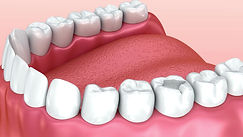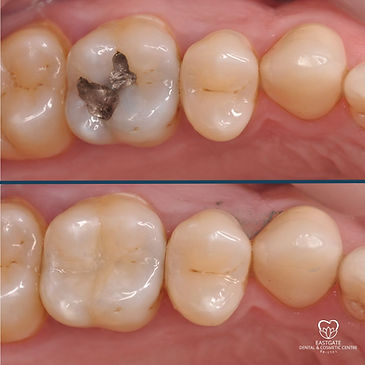top of page

WHITE FILLINGS
At Eastgate Dental & Cosmetic Centre, white fillings are used to restore teeth that have been damaged by decay, trauma or tooth wear to prevent further deterioration of these teeth.
WHAT ARE WHITE FILLINGS?
Composite white fillings are used to restore teeth that have been damaged by decay, trauma, or tooth wear and they prevent further deterioration.
White fillings are a very natural-looking and safer alternative to the more traditional silver amalgam fillings. These restored teeth are therefore strengthened, and their function, structure, and aesthetics are fully restored.

CANDIDATES FOR WHITE FILLINGS
Sugary and acidic foods lead to harmful bacteria and acids which attack the tooth surface forming cavities – a decayed part of the tooth. Tooth wear due to teeth grinding can lead to the exposure of the dentine which can make teeth sensitive while eating and drinking. These worn teeth are also more likely to fracture and crack and therefore it is recommended these teeth are restored with composite white fillings.
WHAT IS THE TREATMENT PROCESS FOR WHITE FILLNGS?
Treatments with composite white fillings are carried out under local anaesthetic, where the cavity is thoroughly cleaned. The composite white filling is then placed into the cleaned cavity, shaped, and then polished.
The main benefit of composite white fillings is to strengthen and increase the durability of that tooth to prevent further damage and they blend in naturally with the surrounding tooth tissue. The life expectancy of composite white fillings do vary, please speak to your dentist to discuss this further.
-
How often should I book an appointment for the Hygienist?It depends on the individual, some people are more prone to gum disease and some people find it harder to keep their teeth clean. If your oral hygiene is good, we recommend booking an appointment with your dentist every 6 months, or if you are more prone, we recommend it as often as every 3 months.
-
Why are hygiene appointments important?Hygiene appointments are integral to maintaining your dental health and keeping your teeth and gums clean. Your appointments will also allow us to treat the different stages of gum disease and prevent any other issues before they develop further.
-
What are the signs of gum disease?Gum disease is very common in the UK but it often goes unnoticed until it becomes severe. Common symptoms to look out for include a swollen and red appearance to the gums, and tenderness and bleeding while brushing. Another common sign is the receding of the gums, and the feeling that your teeth are becoming looser.
bottom of page

